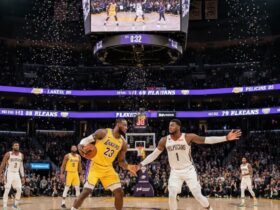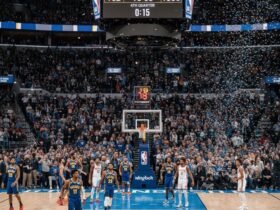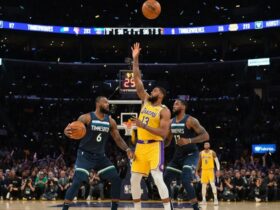When it comes to thrilling matchups in the NFL, few rivalries stand out like the Denver Broncos vs Chargers showdown. Each game brings its own drama, momentum shifts, and unforgettable performances. In this article, we’ll dive deep into the player stats from the Denver Broncos vs Chargers match, offering you a detailed breakdown of how individual performances impacted the game, as well as expert insights into the key players’ contributions.
In this analysis, we’ll explore both offensive and defensive stats, highlight the top players from each team, and give you actionable takeaways to better understand what made this game a memorable clash. Whether you’re a Broncos fan, a Chargers supporter, or simply a lover of football stats, this article provides the comprehensive, authoritative analysis you need.
Denver Broncos vs Chargers: A Rivalry Fueled by Competitive Spirit
The Denver Broncos vs Chargers rivalry is one of the most competitive in the AFC West, with both teams vying for dominance within the division. The tension is always palpable, and every matchup feels like a high-stakes affair. This game, like many before it, lived up to expectations, with players stepping up in crucial moments to impact the outcome.
As we analyze the player statistics from this particular matchup, we’ll break down both teams’ key players in a way that highlights their contributions in the game. Understanding individual performances is crucial, as it not only helps fans appreciate the effort of their favorite players but also provides valuable insights for coaches and analysts alike.
Also Read: Elliott Kropf New Canaan CT: Latest Updates and Community Impact in 2024
Key Player Stats: Offensive Breakdown
Denver Broncos Offensive Performance
The Broncos’ offensive strategy in this match revolved around maintaining possession and capitalizing on scoring opportunities. The team was led by standout performances from their quarterback and running back, both of whom played pivotal roles in the game’s outcome.
Quarterback Performance: Russell Wilson
Russell Wilson, the Broncos’ veteran quarterback, had a mixed performance, but his leadership was essential in key moments. Here are his key stats:
- Passing Yards: 295
- Touchdowns: 2
- Interceptions: 1
- Passer Rating: 95.7
Wilson’s ability to spread the ball to various receivers was evident in his 295-yard passing performance. Although he threw an interception, he made up for it with two critical touchdown passes that kept the Broncos in the game. His quick thinking and ability to read the defense were key to keeping the offense moving forward.
Running Back: Javonte Williams
Javonte Williams continues to be a cornerstone of the Broncos’ offense, and his performance in this game was no different. Williams rushed for 112 yards on 22 carries, averaging 5.1 yards per carry, and scored one touchdown. His ability to break tackles and gain extra yards after contact made him a critical part of the Broncos’ ground attack.
- Rushing Yards: 112
- Carries: 22
- Touchdowns: 1
- Yards per Carry: 5.1
Williams’ hard-nosed running style helped balance the Broncos’ offensive attack, and his touchdown run in the second half was a turning point in the game. His ability to control the clock and keep the Chargers’ defense on their heels was an integral factor in the game’s outcome.
Wide Receiver: Courtland Sutton
Courtland Sutton, the Broncos’ top receiver, had an excellent outing in this matchup, finishing with 105 receiving yards on 8 receptions. He was crucial in converting third downs and providing Wilson with a reliable target throughout the game.
- Receiving Yards: 105
- Receptions: 8
- Touchdowns: 1
- Yards per Reception: 13.1
Sutton’s ability to gain yards after the catch and his ability to make critical receptions in tight coverage made him a standout performer. His touchdown reception from Wilson was a pivotal moment in the game, giving the Broncos the lead at a crucial point in the second half.
Los Angeles Chargers Offensive Performance
The Chargers’ offense, led by quarterback Justin Herbert, looked to exploit the Broncos’ defense with a fast-paced aerial attack. Herbert’s passing was a key component of the Chargers’ game plan, and his performance showcased his elite arm talent and ability to read defenses.
Quarterback Performance: Justin Herbert
Justin Herbert is known for his deep ball accuracy and his ability to stretch the field, and he demonstrated that ability in this game. Herbert threw for 320 yards and 3 touchdowns, but an interception in the second quarter halted a promising drive.
- Passing Yards: 320
- Touchdowns: 3
- Interceptions: 1
- Passer Rating: 109.3
Herbert’s connection with his wide receivers was on full display as he spread the ball around, hitting multiple targets down the field. His ability to avoid pressure and make throws in tight windows kept the Broncos’ defense on its toes. Despite the interception, Herbert’s 3 touchdowns were critical in keeping the Chargers in contention.
Running Back: Austin Ekeler
Austin Ekeler is one of the most versatile running backs in the NFL, and he proved it once again with a solid performance in this game. Ekeler contributed in both the running and passing game, totaling 135 yards from scrimmage.
- Rushing Yards: 45
- Receiving Yards: 90
- Touchdowns: 2
Ekeler’s ability to catch passes out of the backfield was key for the Chargers’ offense. His two touchdowns—one rushing and one receiving—were a direct result of his versatility and ability to create mismatches in the passing game. Ekeler’s contributions were invaluable in providing Herbert with additional options, especially in short-yardage situations.
Wide Receiver: Keenan Allen
Keenan Allen, the Chargers’ top wide receiver, had a massive game, finishing with 118 yards and 2 touchdowns on 10 receptions. Allen’s precision route running and ability to create separation were crucial in moving the ball down the field.
- Receiving Yards: 118
- Receptions: 10
- Touchdowns: 2
- Yards per Reception: 11.8
Allen’s two touchdown receptions came at key moments in the game, helping the Chargers build a lead in the third quarter. His consistency and ability to make plays under pressure made him Herbert’s go-to target throughout the game.
Also Read: Seahawks vs Chicago Bears Match Player Stats: Game Insights & Key Performances
Defensive Standouts: Key Players Making an Impact
Denver Broncos Defensive Performance
On the defensive side, the Broncos’ defense struggled to contain the Chargers’ high-powered offense, but there were still a few standout performances.
Linebacker: Alex Singleton
Alex Singleton was one of the bright spots for the Broncos’ defense. He finished the game with 12 total tackles, including 2 tackles for loss, and was instrumental in slowing down the Chargers’ run game. Singleton’s ability to read plays and deliver key tackles in the open field was vital in keeping the game within reach.
- Total Tackles: 12
- Tackles for Loss: 2
- Passes Defended: 1
Singleton’s defensive presence helped limit the Chargers’ big plays, and his leadership on the field allowed the Broncos to adjust their defensive schemes as the game progressed.
Los Angeles Chargers Defensive Performance
The Chargers’ defense, despite allowing some big plays, stepped up when needed and made critical stops, particularly in the second half.
Defensive End: Joey Bosa
Joey Bosa was a disruptive force for the Chargers, registering 3 quarterback hits and 1 sack. His ability to pressure Russell Wilson throughout the game was a key factor in limiting the Broncos’ passing game.
- Sacks: 1
- Quarterback Hits: 3
- Tackles for Loss: 1
Bosa’s ability to get to the quarterback and collapse the pocket put constant pressure on Wilson, forcing him to make hurried throws and contributing to his interception.
Conclusion: Key Takeaways from the Denver Broncos vs Chargers Match
In the end, the Denver Broncos vs Chargers matchup was a game of momentum swings, with standout individual performances shaping the outcome. The Broncos’ offense showed flashes of brilliance, with Wilson, Williams, and Sutton playing pivotal roles. However, the Chargers’ ability to execute in crucial moments, led by Herbert, Ekeler, and Allen, gave them the edge in this contest.
Key stats from the game, including passing yards, rushing yards, and defensive pressure, revealed how each team’s strengths and weaknesses played out. While the Broncos’ defense fought hard, the Chargers’ explosive offense ultimately proved to be the difference.
For fans and analysts alike, this game is a great reminder of how individual performances can turn the tide of a matchup, whether it’s a quarterback throwing a perfect deep ball, a running back breaking tackles, or a defensive lineman sacking the quarterback at a critical moment. Looking ahead, both teams will have to continue refining their strengths and addressing their weaknesses as they head into the next phase of the season.
Also Read: Lakers vs Denver Nuggets Stats: An In-Depth Look at Recent Performance
Frequently Asked Questions
1. Who were the standout players in the Denver Broncos vs Chargers game?
Key standout players included Russell Wilson, Javonte Williams, Courtland Sutton, Justin Herbert, Austin Ekeler, and Keenan Allen. These players made the biggest impact on their respective teams, contributing heavily to both offensive and defensive plays.
2. How did the Broncos’ defense perform against the Chargers’ offense?
While the Broncos’ defense struggled to fully contain the Chargers’ high-powered offense, Alex Singleton was a standout with 12 tackles and 2 tackles for loss. The Broncos’ defense did manage to limit some big plays, but ultimately, the Chargers’ offense was too explosive.
3. What were the final player stats for the Chargers’ offensive players?
Justin Herbert passed for 320 yards and 3 touchdowns, Austin Ekeler totaled 135 yards from scrimmage and 2 touchdowns, and Keenan Allen caught 10 passes for 118 yards and 2 touchdowns.
4. What can the Broncos learn from this game?
The Broncos should focus on maintaining a more consistent offensive rhythm and improve their pass protection. Defensively, the team must find ways to pressure the quarterback without allowing big plays to the opposing wide receivers.
For More Updates Visit: Biomagazine












Leave a Reply